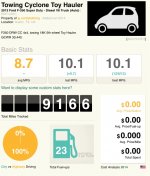That is good mileage too. I am glad you say your 2002 F350 DRW got good or better than 2013. I think I could afford the 2002 easier than the 2013. I am thinking I misunderstood scottyb on his " empty" definition. We' ll have to wait for him to chime in. How much weight are you towing now and your mpg and mph towing. Also how well did you do towing with the 2002 / weight / mpg/mph?
Both trucks towing our same Big Country, which weighs right around 15,500 lb.
2013 - Typically about 10.5 average towing at 65 mph. I've seen 11 a couple times on level ground (i.e. I-10 across MS/LA). 16-17 empty rural/city mix, 18-20 empty 65-70 mph highway.
2002 - Typically about 9.5 average towing at 65 mph. I'd rarely see it climb into the 10.0 to 10.5 range, if ever. 17-ish empty rural/city, 18.5-20.5 empty 65-70 mph highway.
I think the biggest empty difference would be attributable to the extra fuel used to clean the DPF on the newer truck. I can watch the average MPG slowly tick down when it does an active regeneration.
For the difference in towing, the truck typically does passive regenerations (meaning that the DPF stays hot enough due to the extra load to not need to dump extra fuel out the exhaust to actively regenerate. That and the extra HP and Torque means I don't need as much throttle to maintain speed. Gearing plays a minor role, as well (both trucks had 3.73 rear ends, but the 2013 has a taller top gear).
By the way, these are all hand-calculated MPG. I use the app Gas Cubby to track all my fuel usage. The 2002's MPG gauge was fairly optimistic whereas the 2013's is pretty much accurate to within a couple percent.

